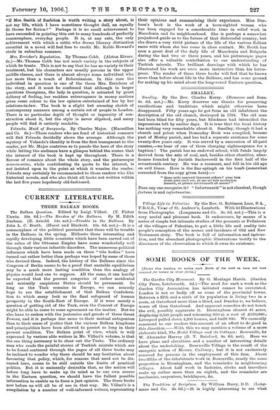C URRENT LITERATURE.
THREE BALKAN BOOKS.
The Balkan Question. Edited by Luigi Villari. (T. Fisher Unwin. 10s. 6d.)—The Burden of the Balkans. By M. Edith Durham. (E. Arnold. 14s. net.)—Trouble in. the Balkans. By John L. C. Booth. (Hurst and Blackett. 10s. 6d. net.)—It is a commonplace of the political pessimist that there will be trouble in the Balkans in the spring. Hitherto those interesting and rapidly developing little countries which have been carved out of the relics of the Ottoman Empire have come wonderfully well through their various infantile disorders. The numerous political influences which have been made on these "vile bodies" have turned out rather better than perhaps was hoped by some of those who devised them. Indeed, the history of the Balkans since the Congress of Berlin seems to be a proof that unstable equilibrium may be a much more lasting condition than the analogy of physics would lead one to suppose. All the same, it can hardly be expected that the present congeries of rather accidental and mutually suspicious States should be permanent. So long as the Turk remains in Europe, we can scarcely hope to see the establishment of that Balkan Confedera- tion to which many look as the final safeguard of human prosperity in the South-East of Europe. If it were merely a question of getting rid of the Turk, even the Concert of Europe might be able to come to some agreement on the matter. But we also have to reckon with the jealousies and greeds of three Great Powers, and it is perhaps due more to their mutual antagonism than to their sense of justice that the various Balkan kingdoms and principalities have been allowed to persist so long in their present condition. The Balkan point of view, which is well expressed by various able writers in Mr. Villari's volume, is that the one thing necessary is to clear out the Turks. The ordinary man who reads the painful stories of Turkish misrule which are to be found scattered through the pages of all three books may be inclined to wonder why there should be any hesitation about favouring that policy, which, for reasons that need not be dis- cussed here, seems to be still outside the limits of practical politics. But it is eminently desirable that, as the nation will before long have to make up its mind as to our own course in the Eastern question, we should have the fullest possible information to enable us to form a just opinion. The three books now before us will all be of use in that way. Mr. Villari's is a compilation by a number of well-informed writers, representing their opinions and summarising their experience. Miss Dur- ham's book is the work of a keen-sighted woman who has been engaged for a considerable time in relief work in Macedonia and its neighbourhood. She is perhaps a somewhat prejudiced guide as to the future of that distressful country, but she draws a very vivid picture of the life of the various Balkan races with whom she has come in close contact. Mr. Booth has seen a great deal of the daily life of Macedonia and Bulgaria during the last two or three years, and his picturesque pages also offer a valuable contribution to our understanding of Turkish misrule. The brilliant drawings with which ho has illustrated his work are even more instructive than his letter- press. The reader of these three books will feel that he knows more than before about life in the Balkans, and has •some ground for making up his mind about the long-vexed Eastern question.










































 Previous page
Previous page